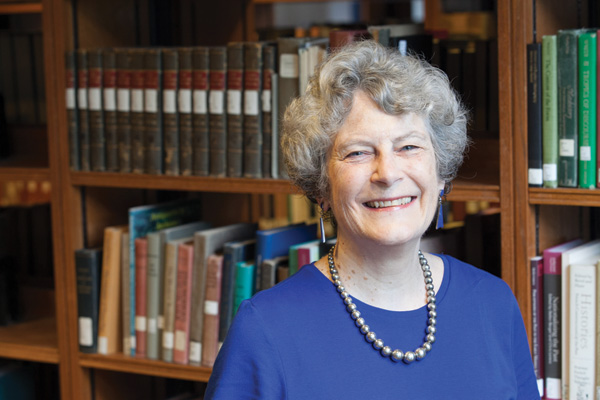Forty Years of Feminism at Vassar
This story begins way back in 1973, a time when there were no PhD programs and barely any courses in “women’s studies” at any university. In a job interview, Vassar’s Political Science Department asked me—a political theorist who had never taken a course on women—if I would teach a course on women and politics. Since I wanted the job, I shamelessly said, “Of course.” Unexpectedly, the study of gender became my life’s work. I taught some version of that course every year.

Approaching retirement, I thought about ways to help students to see that the issues we study—sexual discrimination; the nature of gender identity; intimate partner violence; intersections of gender, class, race, and sexual orientation—have endured and changed across the decades at Vassar (pre- and post-coeducation). Moreover, these issues affect students’ daily lives on campus. I wanted them to read articles and books by others, and also to examine their own experiences as rich sources of insight.
Then inspiration struck! Why not have current students discuss feminist theory and practice with alumnae/i who had taken the course? “Go to the source,” advises Vassar’s famous pedagogic principle, and 40 years of former students could make these issues come alive for today’s students.
AAVC sent a letter explaining the project to alumnae/i who had taken my feminist theory courses. Small groups of students studied each decade, and pairs of students conducted interviews with willing alums by phone or email. With the help of Vassar research librarians, before the interviews, students scoured the Miscellany News, the Sesquicentennial website, and the online Vassar Encyclopedia to learn about feminist issues and controversies on campus during “their” decade.
The students were galvanized by the discovery that prior generations of students had shared many of their experiences and concerns. While specific manifestations of issues involving gender, race, class, and sexuality change from decade to decade, underlying concerns and tensions persist.
So, for example, the 1960s debates about whether Vassar should go coed prompted today’s students to examine their own views about Strong House remaining an all-female dorm. They realized that their contemporary worry about how to create “safe spaces” for identity-based groups without promoting exclusionary attitudes also had confronted the campus back when Kendrick House was a dorm for African American students, the ALANA Center was opened, and the Women’s Center was established.
They realized that the campus has grappled repeatedly with the complexity of defending academic freedom while insisting that hurtful and hateful speech is unacceptable in our community. Today, many experience discomfort and occasional outrage over what they regard as offensive postings on the Say Anything blog. In 1990, students occupied Main Building protesting remarks by visiting Senator Daniel Patrick Moynihan that were alleged to be racist and sexist. In 2005, when
The Imperialist student newspaper referred to campus spaces for minority students (like the ALANA Center and Blegen House) as “ghettos,” and illustrated the article with a sexualized caricature of a black woman, people vehemently argued over whether offensive speech should ever be tolerated on campus.
Students traced tensions within the LGBTQI community through campus reaction to AIDS/HIV in the 1980s, the cross-dressing and undressing at Homo Hop festivities of the 1990s, the organizational split between QCVC (the Queer Coalition at Vassar College) and Act Out in the 1990s, and today’s Flawless drag show.
The need to confront sexual assault on campus arose in every decade—a sobering realization. Some students who had done field work at Battered Women’s Services discussed relationship violence both on and off campus with their alums as well as classmates.
And, dear to my heart, by learning about the debates surrounding the establishment of the Women’s Studies Program, students became aware of how the curriculum constantly changes and responds to intellectual and real world issues.
The communal spirit and generosity of the Vassar alumnae/i helped students put the world of ideas into dialogue with their everyday experiences and hone their skills for a lifetime of thought, observation, interpretation, and action.
There is certainly every reason to hope that they will be as generous to future generations of Vassar students as today’s alumnae/i were to them. I am profoundly grateful to Vassar’s students and alums for the four decades of dialogue and learning that so enriched my life.
Molly Shanley is professor of political science on the Margaret Stiles Halleck Chair at Vassar College. She will retire in June of 2015.
